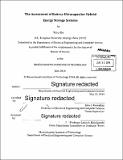The assessment of battery-ultracapacitor hybrid energy storage systems
Author(s)
He, Yiou
DownloadFull printable version (27.27Mb)
Other Contributors
Massachusetts Institute of Technology. Department of Electrical Engineering and Computer Science.
Advisor
John G. Kassakian.
Terms of use
Metadata
Show full item recordAbstract
Battery-ultracapacitors hybrid energy storage systems (ESS) could combine the high power density and high life cycle of ultracapacitors with the high energy density of batteries, which forms a promising energy storage system. In this thesis, an assessment of the benefits of the hybrid ESS relative to its battery-only counterpart in pulse-load applications is investigated for both Nickel-Metal Hydride (NiMH) batteries and Lithium-ion (Li-ion) batteries, and under different load profiles. Specifically, the hybrid ESS in this assessment is of the simplest type - paralleling the ultracapacitors across the batteries without any power electronics interface between them. To quantify this assessment, Discharge Capacity(0) is defined as the amount of energy one can draw out of an ESS per unit charge supplied by this ESS. The metric for quantifying the benefits is energy efficiency gain, defined as the percentage increase in the discharge capability of the hybrid ESS over its battery-only counterpart. The investigation proves that the hybrid system is more beneficial over the battery-only system in terms of how much energy it can output at a specific state-of-charge level. Among the test cases covered by this thesis, the increase in the output energy of Li-ion battery systems by incorporating ultracapacitors can reach to 17% and that of Ni-MH battery systems can reach to 33%. This thesis also shows that the benefits of paralleling ultracapactors across batteries depended upon the discharge profile of the load, the battery type and the capacitance. The benefits increase quadratically with the pulse amplitude, decreases linearly with the duty cycle and inverse with the pulse period. Moreover, capacitors with higher capacitance and lower ESR yield to larger benefits. And for batteries with a higher ESR, the ultracapacitors will show more benefits than for batteries with low ESR.
Description
Thesis: S.M., Massachusetts Institute of Technology, Department of Electrical Engineering and Computer Science, 2014. 55 Cataloged from PDF version of thesis. Includes bibliographical references (pages 154-157).
Date issued
2014Department
Massachusetts Institute of Technology. Department of Electrical Engineering and Computer SciencePublisher
Massachusetts Institute of Technology
Keywords
Electrical Engineering and Computer Science.